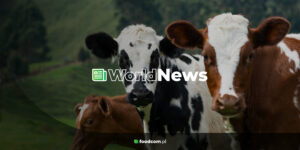Esencja
Spis treści
Europe
To focus on sports nutrition, sometimes you have to ditch the cheese
Irish company Glanbia plans to divest its cheese joint venture to focus on sports nutrition and ingredients, which are at the core of its business. A preliminary, non-binding agreement has already been signed to sell its stake in Glanbia Cheese for more than €160 million. Do you think the popularity of their nutrients will increase when athletes learn that their manufacturer no longer has anything to do with cheese?
A nationwide recession in dairy production is underway in Ukraine
At the same time, farms in the western and central regions of Ukraine have increased their milk and beef production. This happened because these regions were less affected by military actions than others. As a result, there were fewer production interruptions, and some entrepreneurs from the frontline areas also moved their livestock there.
French and Swiss groups cannot restrict the labeling of the cheese as 'Gruyère.’
At least that’s what a U.S. court says. A U.S. appeals court recently ruled that the name 'Gruyère’ can be used to identify cheese made outside the Gruyère region in Switzerland and France. It can be used regardless of where it is produced, as long as it meets the requirements for its parameters. The groups that have requested a restriction on the use of the name say they will continue to fight vigorously for it. What a cheesy dispute, right?
The Americas
2023 – a new record for the United States? Unlikely.
2022 was a year of records for the United States, both in terms of volume and value of dairy products. In terms of volume, it was the third consecutive record year, while in terms of value, it was the second consecutive record year. Given the difficult economic conditions last year and rampant inflation, this is an outstanding achievement. Experts predict that while another record is unlikely in 2023, the U.S. is likely to once again consolidate its position as a growing player in the dairy sector on the international stage.
Uruguay’s dairy industry: problems and an uncertain future
Many dairy farmers are struggling with the drought, which is affecting the decline in milk production from cows, as well as the rising price of feed. The situation is becoming so serious that some dairy farmers, especially those who run smaller farms, are going into serious debt. Producers no longer know what to do.
The decline of milk production in Costa Rica is imminent
Milk producers in Costa Rica are warning that there may soon be less raw material on the market due to high inputs and climate change. In four years, fertilizer prices have increased 220%, while imported corn prices have increased 73.7%, directly affecting feed prices. Domestic dairy companies are likely to focus on the most popular products, such as liquid and powdered milk, but the availability of other products could decline significantly. Prices for all dairy products will certainly increase as well.
Asia & Oceania
Zero carbon emissions in just 10 years? There’s a plan
Fonterra and Nestlé have announced a new partnership to develop the first commercially viable zero-carbon dairy farm in New Zealand. The farm’s carbon emissions are expected to be reduced by 30% by mid-2027, while they are expected to be reduced to zero within a decade. The new solutions are said to be 'good for the farmer, good for the cow and good for the milk.’ We’ll probably have to wait a while to see if they are also good for investors’ wallets.
Red seaweed as a solution for methane production
Australian startup Rumin8 is working on a dietary supplement synthetically replicated from red seaweed that stops methane formation. It will be fed to livestock to reduce methane emissions. Current laboratory results are excellent, company representatives say. It’s interesting that seaweed is so helpful for cows, even those that are not sea cows.
Scientists suggest drinking deer milk
These are not American scientists, but two researchers from Massey University in New Zealand have studied the effects of consuming deer milk on the health of the elderly. Deer milk is richer in protein than cow’s milk. The study found that including deer milk in the diet had a positive effect on increasing muscle mass, bone density and overall health. So, how about a glass a day starting today? But first, you need to find a deer that is willing to cooperate…
Kategorie:







